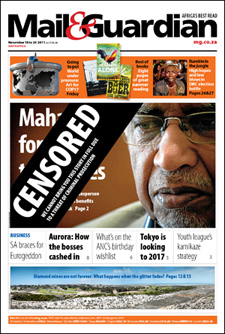New York, November 21, 2011–The spokesman for South African President Jacob Zuma filed a criminal complaint on Saturday against two journalists investigating his alleged role in a $US5 billion international arms deal that became embroiled in scandal, according to news reports.
Weekly investigative paper Mail & Guardian sought comment last week from presidential spokesman Mac Maharaj, also a member of the ruling African National Congress, regarding information leaked from a confidential 2004 police deposition about his role in an arms deal, editor Nic Dawes told the local press. Maharaj asked the journalists how they obtained the information and referred the inquiry to his lawyers, BDK Attorneys, according to news reports. The lawyers threatened the newspaper with criminal prosecution under a 1998 law punishing unauthorized disclosure of a suspect’s testimony in an investigation with a prison term of up to 15 years, news reports said.
To avoid prosecution, Mail & Guardian redacted the cover story and censored large portions of its Friday edition with black ink, news reports said. However, in a public statement on Saturday, Maharaj announced that his lawyers had lodged a criminal complaint against the paper’s senior reporters Sam Sole and Stefaans Brümmer and urged the police “to investigate the possible theft of the records of various inquiries conducted by the National Prosecuting Authority.”
“This criminal complaint by Mac Maharaj is an intimidation tactic that we fear will open the way for the police to investigate the sources of the newspaper,” said CPJ Africa Advocacy Coordinator Mohamed Keita. “We call on authorities to dismiss the complaint and allow the newspaper to publish its story without censorship.”
In a statement issued on Thursday, Maharaj accused the newspaper of “sensational and at times distorted reportage,” and of “depicting my upholding of my rights embodied in our laws as a threat to media freedom.” In a Friday program on Talk Radio 702, he declared, “Press freedom is too important in our democracy, but it must not be abused. They have acted against the law.”
Dawes has indicated that the paper is petitioning the Director of Public Prosecutions for authorization to publish the information staffers obtained. “We believe we have every right to publish the information which raises serious questions about the conduct of the man who speaks on behalf of the president,” he said. “We view this as a clear ploy to use the police to go after our sources,” he told Independent Newspapers.
In a statement today, the South African National Editors Forum expressed concern at what it called “attempts by presidential spokesman Mac Maharaj to censor reports about his appearance before a secret inquiry,” and expressed support for the paper, according to news reports. “Information about Maharaj’s testimony and conduct, given his high-profile role in government and his former role as minister of transport, is of major public interest.”
Several top officials and private businesses were convicted of receiving payouts from European arms manufacturers in a 1999 government deal for fighter jets and naval patrol boats, according to news reports. In September, Zuma, who was once charged in the case, ordered the establishment of a commission to renew a government probe into the matter, news reports said.
News commentators have likened the blackened front page of Mail & Guardian to Apartheid-era censorship, while others have compared the contentious 1998 law to the government-sponsored controversial Protection of Information Bill, which critics have dubbed the “secrecy bill” over its prison terms for journalists disclosing state information, CPJ research showed.
